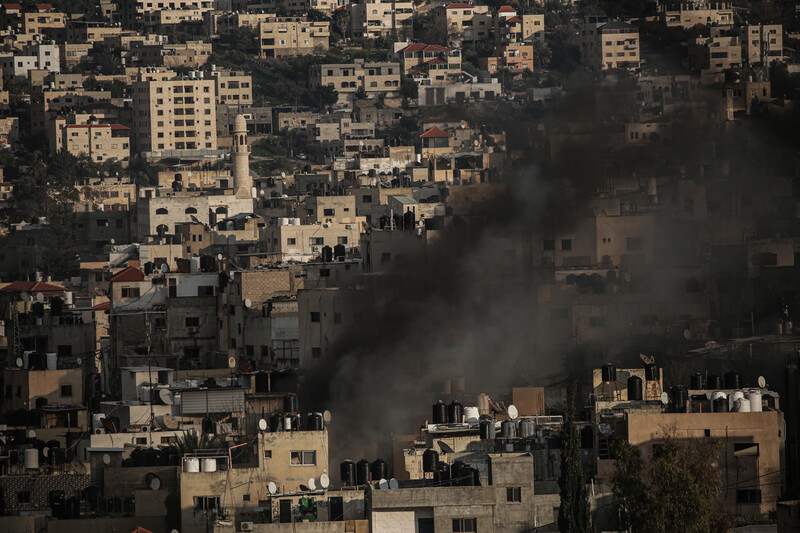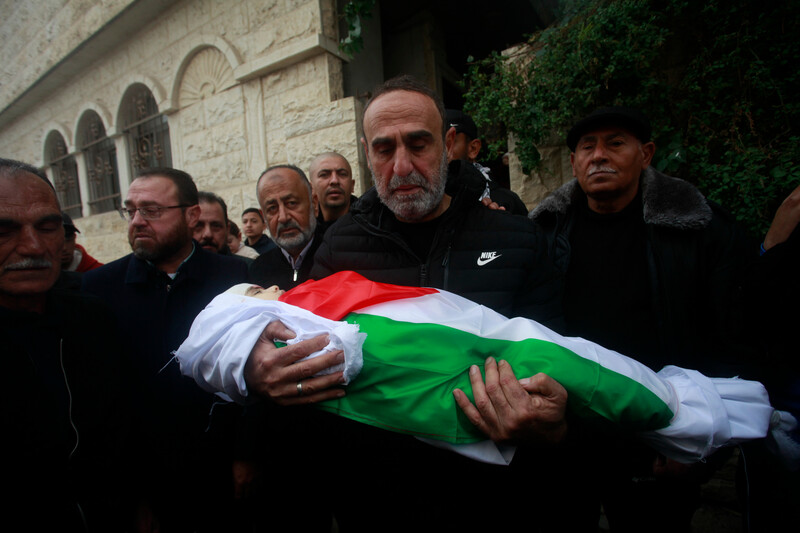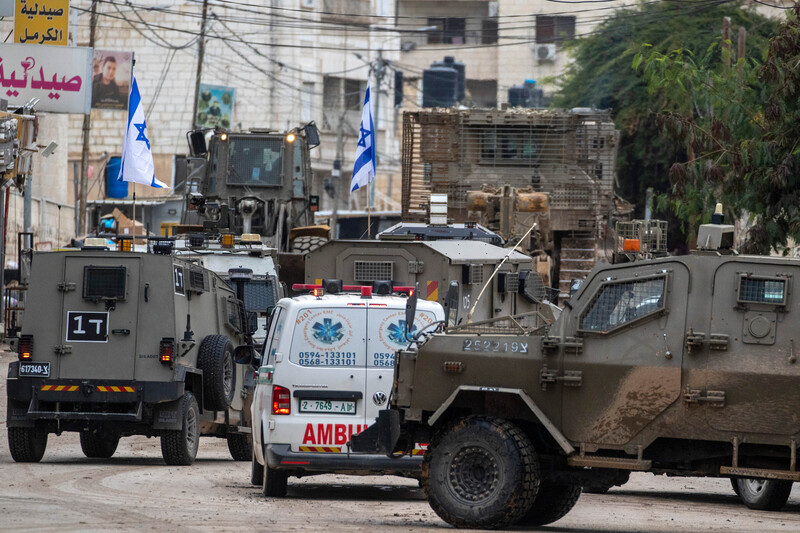Rights and Accountability 5 February 2025

Smoke billows above the Jenin refugee camp skyline in the northern occupied West Bank on 24 January 2025.
APA imagesIsrael is extending its genocidal violence into the occupied West Bank as its deadly assault on Jenin and its refugee camp enters a third week, a Palestinian human rights group has warned.
Dozens of Palestinians have been killed since Israel’s military, police and domestic spy agency, the Shin Bet, jointly launched on 21 January a large-scale, open-ended military operation titled “Iron Wall” in the city of Jenin and its refugee camp, which has since extended to other areas in the northern West Bank, including Tulkarm last week as well as Tamun, south of Tubas, this week.
Israel imposed a total siege on Jenin refugee camp, and deployed hundreds of soldiers – including snipers – there since the military assault began.
The Israeli military carried out several aerial bombardments in densely populated civilian areas and caused widespread destruction of infrastructure and homes across the camp “on a scale not seen there for over 20 years,” Reuters reported.
Israeli troops bulldozed all the roads leading to the refugee camp and the city as well as a number of roads within them. The vast majority of camp residents have been displaced under Israeli orders, some of them even searched and arrested on the way out of the camp.
“The remaining families are living in grave danger with no access to water, electricity, and other basic services,” the Palestinian human rights group Al-Haq stated.
Around 150-180 homes in Jenin have been severely damaged by the Israeli attack, according to the UN monitoring group OCHA.
Israeli assaults on West Bank cities and refugee camps have become “a primary cause” of forcible displacement of Palestinians, accounting for over 40 percent of all displacement documented by OCHA throughout 2023 and 2024. This compares to less than 2 percent in the two years prior.
Killing children and elderly
An Israeli attack decapitated a 14-year-old boy in Jenin on 1 February.
A missile that Israel fired from a drone without warning killed Ahmad Abdelhakim Saadi while he was in the courtyard outside his family home, according to a field investigation by Defense for Children International - Palestine. There was no presence of Israeli troops in the immediate area at the time.
Eyewitnesses told Defense for Children International - Palestine that a relative of the teen named Nour was wanted by Israel. Nour was, according to those witnesses, about to visit Ahmad’s family home before the Israeli drone was fired in front of the house.
Nour survived that strike, but was killed by another drone-fired missile later that day, along with a nurse working in the area.
“Israeli forces are carrying out an ethnic cleansing campaign in the northern occupied West Bank, killing Palestinians and forcing them out of their homes,” said Ayed Abu Eqtaish, accountability program director at DCIP.“Israeli forces are emboldened by the impunity permitted by world leaders who took no action to stop the genocide of Palestinians in Gaza and who are complicit in the campaign to forcibly displace Palestinians in the West Bank.”
Israeli forces shot and killed a 2-year-old girl while she was having dinner with her mother, grandparents and aunts inside her family’s home on 25 January in the town of Muthallath al-Shuhada, south of Jenin in the northern West Bank.Laila Muhammad Khatib was shot in the back of the head.
Her grandfather carried her outside, where he saw Israeli snipers stationed inside a home across the house. Residents of the town were unaware of the Israeli military presence in the area.
The toddler’s mother and aunt also sustained injuries from shrapnel, according to an investigation by DCIP.

Mourners carry the body of 2-year-old Laila Muhammad Khatib, who was shot in the back of the head at home while having dinner with her family, in Jenin in the occupied West Bank on 26 January.
APA imagesIsraeli forces also killed a 73-year-old man in the camp, Walid Muhammad Lahlouh, the Palestinian Authority health ministry has confirmed.
A 17-year-old Palestinian boy was killed when Israel used a drone to fire missiles targeting the courtyard of a home in Tamun on 29 January, killing a total of 10 people. Jihad Naser Bani Matar was with a number of individuals wanted by the Israeli military and whose homes were repeatedly raided.
There was no Israeli army presence at the time of the strike.
Saddam Hussein Rajab, a 10-year-old child, was shot in the abdomen by an Israeli soldier the day before in Tulkarm while he was standing on the sidewalk, as footage of the shooting shows.
Israeli forces attacked Saddam’s father while he attempted to carry the boy to receive aid. The forces even detained the father for nearly an hour.
While the child was getting transferred from one hospital to another, Israeli forces held up the ambulance and one soldier told Saddam’s father: “I am the one who shot your son. God willing, he will die.”
Saddam is still receiving medical care.
At least 70 Palestinians have been killed in the West Bank since the beginning of the year, the Palestinian Authority’s health ministry has said, the vast majority in northern cities and refugee camps.
At least 38 were killed in Jenin, 15 killed in Tubas, six in Nablus, five in Tulkarm, three in Hebron, two in Bethlehem and one in occupied East Jerusalem.
Israeli forces have killed at least 11 Palestinian children in the West Bank since the start of the year – seven by drone strikes and four others by live ammunition.
This toll does not include three Palestinian children killed during the Palestinian Authority raid on the Jenin refugee camp which started in the first week of December and concluded in January.
DCIP has yet to determine the perpetrators responsible for each child’s death during the PA raid, as the subsequent Israeli military incursion has hindered such investigations.
Gaza tactics
On Sunday, the Israeli military razed nearly two dozen buildings in simultaneous bombings “that were heard across much of the northern West Bank,” The Wall Street Journal reported.
Juliette Touma from the UN agency for Palestine refugees (UNRWA) said the camp is going in a “catastrophic direction.”
She said the detonations happened “when children were supposed to go back to school.”
She added that 13 schools in the camp and nearby areas are shuttered, affecting 5,000 children. The UN agency’s services in the refugee camp have been interrupted for months, and had to be completely halted in early December during the assault by the Palestinian Authority.
UNRWA apparently had no warning of the detonations, as there is no longer contact between its staff and the Israeli military since Israel shuttered the agency’s operations last month.
The Wall Street Journal reported that the bombings “resembled a tactic used in Gaza, where the Israeli military created corridors to divide the enclave.”
Footage of the bombings bore similarities to how Gaza’s skyline looked in the first days and weeks of Israel’s genocidal campaign against the coastal enclave.
Israel says it is destroying infrastructure belonging to armed groups. But Israel’s objectives include widening roads to facilitate the invading troops’ movement through the area.“They are attempting to divide the camp into several parts. It’s very similar to northern Gaza,” Michael Milshtein, a former head of the Palestinian division in the Israeli military intelligence, told The Wall Street Journal.
Israel has seen “an opportunity to change the physical structure of the camp,” Tel Aviv daily Haaretz reported, citing an unnamed senior military source.
“The policy would enable the army to more easily strike armed militants, who are often able to escape or take shelter in densely built-up areas,” the newspaper added.
One Israeli military analyst gave partial credit to Palestinian armed groups in the West Bank for Israel’s inability to respond to Hamas’s attack on 7 October 2023.
“The increasingly frequent attacks forced Israel to deploy much of its army in the West Bank. That partly explains why Israel failed to defend its border with Gaza when Hamas attacked,” The Wall Street Journal reported, citing Eado Hecht, an Israeli military analyst who teaches at an academy that trains senior Israeli army officers.
Indeed, Benjamin Netanyahu and the right-wing members of his government are presenting the Israeli military’s deadly assaults in the West Bank as a continuation of the war in Gaza. The most extreme Israeli ministers opposed last month’s ceasefire in Gaza, which Netanyahu was strongarmed into accepting by US President Donald Trump in the days leading up to his inauguration.
“Genocidal”
The Palestinian human rights group Al-Haq has warned that Israel is using many of the same tactics in the West Bank that it employed throughout its genocide of Palestinians in Gaza.
“Israel’s genocidal tactics to destroy the Palestinian group are further evident in the West Bank, including Jerusalem,” Al-Haq warned.
The tactics include attacks on hospitals, patients and staff, extensive destruction of Palestinian areas, and the wanton killing of Palestinians.
On the day Israel launched its operation in Jenin, independent UN expert Francesca Albanese issued a similar warning.
“If it is not forced to stop, Israel’s genocide of Palestinians will not be confined to Gaza. Mark my words,” she wrote on X, formerly Twitter, remarking that 10 Palestinians had been killed in Jenin already.
“The situation in the northern West Bank is a painful reminder of the first weeks that followed 7 October 2023,” Al-Haq stated.
Israel’s defense minister Israel Katz has indicated that the operation draws on lessons from Israel’s genocide of Palestinians in Gaza.

Israeli forces prevent ambulances from entering the Jenin refugee camp, in the occupied West Bank, on 22 January.
ActiveStillsLast month, Bezalel Smotrich, the Israeli finance minister, explicitly called for the same kind of violence Israel has used in Gaza to be inflicted on Jenin.
“Funduq, Nablus and Jenin need to look like Jabaliya,” he said, referring to three Palestinian cities in the northern West Bank and an area in northern Gaza where Israel caused massive destruction over the past 15 months.
In August, Israel Katz – then foreign minister – even explicitly called for Israel to display “the same determination” as in Gaza. He advocated the “temporary evacuation of Palestinian residents and any necessary measures.”
These methods are already being applied in Jenin.
Katz suggested recently that the military’s aim is to remove armed resistance from the Jenin refugee camp, so that “terrorism does not return to the camp after the operation is over – the first lesson from the method of repeated raids in Gaza.”





Comments
Nazism
Permalink Peter Purich replied on
While the child was getting transferred from one hospital to another, Israeli forces held up the ambulance and one soldier told Saddam’s father: “I am the one who shot your son. God willing, he will die.” -- beyond Nazism.
Add new comment